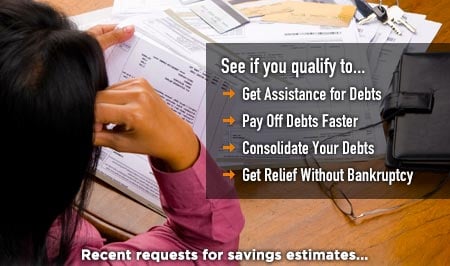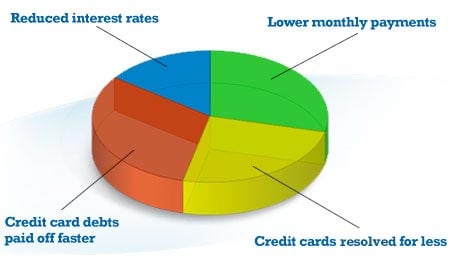
Debt Management
With countless numbers of Americans in debt, many are turning to proven debt management solutions to, not only reduce or eliminate debt, but also to help remove the stress over mounting debt. While the U.S. government's recent bank bailouts and financial lifelines have received widespread media attention, many consumers deep in debt are wondering if a similar bailout is available to them. The answer is no. However, there are a variety of debt relief options that are available to consumers struggling with credit card debt. Among the most popular: credit counseling, debt consolidation, debt management plans, and debt settlement or debt forgiveness.
You can learn more about available debt relief options by answering a few short, simple questions online, and, in just minutes online, you can request a free, no-obligation, debt relief evaluation and savings quote.
How Debt Management Programs Work
Out-of-control credit card debt can create equally out-of-control levels of stress. Bills mount, late fees add up, penalties escalate, creditors call constantly, with little or no relief on the horizon. The good news is that a wide variety of debt management plans and solutions may be able to meet the needs of consumers deep in debt, hopefully relieving stress and saving substantial amounts of money in the process.
Credit Counseling Debt Management Plan
Credit counseling debt management plans are often able to help consumers reduce or get out of debt on an accelerated timetable by helping consumers "consolidate" credit cards and various unsecured debt into an easier-to-manage, single, monthly payment. The main objective of the credit card counseling company is to secure lower interest rates and more favorable payment terms by submitting proposals to credit card companies, one-by-one, on the consumer's behalf. Once accepted by the credit card company, each individual creditor, is added to the consumer's individual debt management plan (DMP) as the consumer makes a single monthly payment to the credit counseling service to pay down all debts that have been placed in the program. That payment is then distributed by the counseling service to each individual creditor. New Yorkers in need of debt relief may realize significant benefit and savings from debt relief as the program typically can not only help to simplify finances, but also help consumers get out of debt faster than they could on their own if they were to continue treading water by paying only the minimums each month AND at a higher interest rate.
To find out what debt relief could do for you and how much you could save, get your free debt relief analysis and savings estimate today at no obligation.
Credit Card Debt Settlement
The debt relief program known as "debt settlement" varies significantly from debt consolidation as administered by credit counseling services. Above all, it differs in that with a debt management plan the consumer pays back ALL THAT IS OWED, except at an interest rate more affordable and a payment schedule which is more favorable. With debt settlement, on the other hand, the consumer's goal is to "settle" credit card debt for substantially less than is actually owed.
Debt settlement requires consumers in debt to build-up a lump sum of money, set it aside, and use these accumulated funds to make a settlement offer to credit card companies who may or may not agree to the settlement offer. Why would credit card companies agree to accept less? For several reasons. Maybe they project that the consumer, who has already fallen behind, will have a great deal of difficulty paying the full amount. And, credit card companies may be faced with the prospect of "selling off" the "bad" debt to a third-party collector for as little as 10 cents on the dollar. In this scenario, it stands to reason that credit card companies would be willing to consider a reasonable settlement offer made by the consumer or by a debt settlement negotiator on the consumer's behalf.
Again, it is important to note that, with debt settlement, credit card companies may agree to "settle" or "forgive" a substantial amount of debt or they may not. During the period before a decision from the credit card company is finalized, the consumer who has fallen behind on the unsettled debt obligations is exposed to potential legal action. On top of that, the consumer's credit can be negatively affected due to non-payment. The encouraging aspect to what can otherwise be a stressful period of uncertainty is that while the consumer is not making regular credit card payments, they're hopefully able to set aside the required money for a successful settlement. For many, debt settlement is a popular choice for those seeking debt relief or management of debt due in part to the large amounts of money saved in some cases and the fact that the impact on credit, while negative, is not as severe or long-lasting as a personal bankruptcy.
How much can, or cannot, be saved with debt settlement is largely a function of the amount of outstanding credit card debt, the specific companies involved, the respective debt relief policies of those companies, and the financial situation of the debtor.
The facts remain that credit card companies are often open to a reasonable settlement offer direct from the consumer or done by a debt settlement company on the consumer's behalf. Clearly it's logical for a credit card company to be open to recoup what amount they can from the consumer, rather than go the route of selling off bad debt for substantially less. Clearly, at a time when more and more consumers are deep in debt with little prospects for getting finances under control, debt settlement, while an aggressive form of debt relief, has become increasingly popular as a viable alternative to bankruptcy - that doesn't affect credit as severely and doesn't have the same psychological impact or stigma as bankruptcy.
Generally, among debt relief solutions, debt management through a credit counseling agency is considered by many to be the most honorable form of debt relief in that consumers are doing their best to pay back all debt that was accumulated, just at much more favorable terms. In today's challenging economy, however, many consumers are struggling to such a degree that many credit card companies are open to a fair settlement, often accepting offers from consumers who can come up with a reasonable settlement amount. It should be noted however, that for certain individuals and families, bankruptcy is still the solution that makes the most sense as many individuals and families are so deep in debt, have little resources available to settle, and truly need a debt relief solution that provides debtors with a fresh start and new lease on life.
A final thought regarding debt management: For New Yorkers struggling with debt, there is the temptation to take-out debt consolidation loans. For those saddled with high interest rate credit cards and mounting debt, this option could have a downside. Debt consolidation loans typically will involve paying off unsecured debt by putting up your home or other asset as collateral. Should you default on the terms of your debt consolidation loan, you could risk losing your home or other collateral used. It's always wise to consider ways to get out of debt, rather than take a more debt to pay off existing debt. This can often cause your financial situation to go from bad to worse.
To see what debt relief could do for you, and how much you could save, answer a few simple questions online to request your free debt relief evaluation and savings quote, at no obligation.





















